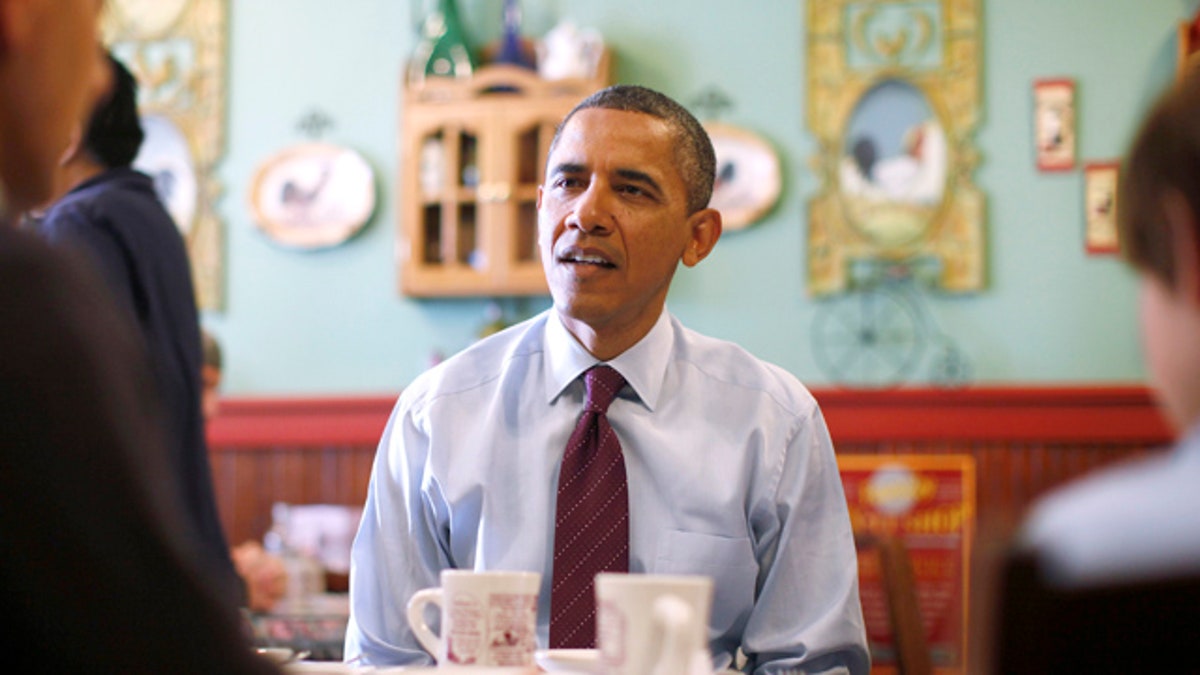
Nov. 22, 2011: President Obama visits a restaurant in Manchester, N.H. (AP)
Even before the Super Committee convened – and failed to find a formula for reforming entitlements -- Democrats wielded a familiar refrain to reject any Republican effort to save Medicare by offering competition.
"Put simply, it ends Medicare as we know it," President Obama said earlier this year about GOP proposals.
Senate Democratic leader Harry Reid, D-Nev., also blasted Republican plans, and employed the same "end Medicare as we know it" phrase, before going on to say it would subject seniors to the rising costs of health care.
James Kvaal, Obama's campaign policy director, threw the same stone at Mitt Romney, arguing that the Republican presidential candidate's plan to offer both traditional Medicare and access to private plans would end seniors' medical coverage.
But as it turns out, Obama himself sharply limits Medicare spending and Democrats actually voted for it in the new health care law, fundamentally altering the program "as we know it," say analysts.
"President Obama ended it as we know it," said James Capretta of the Ethics and Public Policy Center. "The one thing I don't think the public really understands is that the health care law has already capped Medicare spending and President Obama was the proponent of that cap."
In the new health care law, Medicare is slashed by $500 billion and growth in Medicare spending is capped to just 1 percent over growth in the overall economy.
In an 80-page message addressed to the Super Committee, Obama proposed another $250 billion in Medicare cuts along with lowering the limit on Medicare spending to gross domestic product plus 0.5 percent. He would cap spending at the lower number by reducing reimbursements.
Since Medicare typically grows 2 or 3 points more than GDP plus inflation, or at around 7-9 percent annually, seniors lose ground every year.
"Any time we have an arbitrary cap that's not reachable, where benefits could be harmed, we would be opposed," said David Certner, policy director for American Association of Retired Persons.
Some critics are concerned about how the president will enforce limits. He'd use the Independent Payments Advisory Board, or IPAB, created by the health care law. But it only has one power to hold down spending -- impose price controls on providers.
"If there's a cost that go above the cap, we're going to be stopping care for that year and in essence lead to rationing of care," Certner said. "So we can't have arbitrary caps in the Medicare program."
When doctors, surgeons or those who make knee or hip replacements are simply told they'll be paid significantly less, what will they do? Capretta said he fears the worst.
"Eventually some of the providers of those services will drop out of the market and there will be issues in terms of accessing care," he said. "That's what the Medicare actuary has already predicted will occur under the health care law."
Medical groups say they expect a shortage of some 90,000 doctors by the end of this decade, as 30 million baby boomers have begun to retire, making access to care even tighter.
Democrats resisted cutting Medicare in the now-defunct Super Committee negotiations, but the hospital trust fund will not be able to pay full benefits in 2024. That means far more will have to be done than some are willing to contemplate now if Medicare is to be preserved for future retirees, and if the nation wants to avoid not only 'ending Medicare as we know it,' but avoid ending it altogether.




